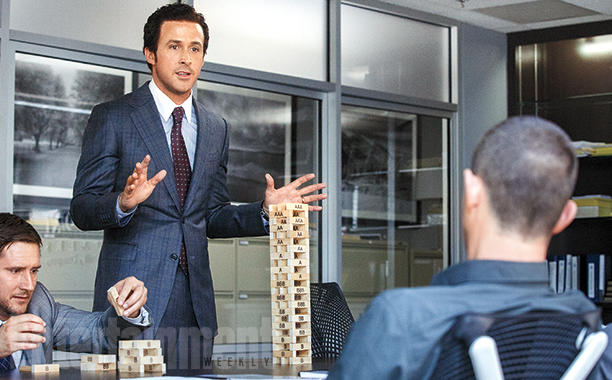The Big Short (2015)

Absurdist slapstick comedy director Adam McKay (Anchorman 2, Talladega Nights) comes into his own with The Big Short, a semi-comedic adaptation of the Michael Lewis non-fiction novel about the build-up to the calamitous housing market crash of 2008, where greed and cockiness on the part of banking institutions and Wall Street wheelers and dealers ended up tanking the world economy resulting in millions upon millions of people losing their jobs and their homes. A handful of those who monitor the industry would see the writing on the wall, willing to invest their money in a play for the system to fail after their warnings produced either laughs or shrugs from those within the industry who would rather believe their upward trajectory was more indicative of continued success than just the wild guesses from a person they don’t even know.
Bolstered by a dynamite cast, The Big Short has several converging story threads, beginning with a socially awkward hedge-fund manager named Dr. Michael Burry (Bale, Exodus: Gods and Kings), who determines that the subprime mortgage industry is a bubble built on a slew of misguided practices that’s inevitably going to burst, so he invests his company’s available assets, totaling 1.3 billion dollars, to bet against them. Douchebag banker Jared Vennett (Gosling, Gangster Squad), who also serves as the film’s narrator, catches wind of Burry’s activities and looks into it himself, and soon he also becomes convinced that CDO’s (collateralized debt obligations), a hodge-podge of mostly junk bonded loans, will result in the market eventually failing.
The only one who will partner with Vennett is a smaller hedge fund headed by Mark Baum (Carell, Alexander and the…Bad Day), who, despite being initially skeptical, sees the iceberg headed toward the Titanic and is willing to make a major play, though his conscience is persistently troubling him. Meanwhile, a couple of small-time investors secure the expertise of a former financial strategist, Ben Wickert (Pitt, By the Sea), to help them play with the big boys, hoping they’ll make a fortune. As the mortgage industry is considered the bedrock of the investment market, banks are all too happy to let these “suckers” bet against its success.
McKay, directing his first theatrical film without Will Ferrell as the star, delivers a witty and zippy film that deals with a confusing and complex topic of world economics that most people in the viewing public can barely wrap their heads around. To keep everyone on board, McKay and co-screenwriter Charles Randolph (The Interpreter, Love & Other Drugs) employ a handful of celebrity cameos to break the fourth wall and educate us, “For Dummies” style, enough to keep up with what’s going on in the simplest of terms possible. Margot Robbie, Anthony Bourdain and Selena Gomez appear out of nowhere, as the film’s special guests, to give us the gist of the set-up of the financial aspects — the structure of subprime loans, mortgage bonds, CDO’s, tranches, etc. — that made the collapse inevitable. The financial fleecing of America seems a particularly passionate subject for McKay, who ended one of his previous comedies, The Other Guys, with an end-credits sequence of various graphics spelling out the outrageous financial inequities going on in the country.
It’s a film that is making the bet, rightly, that many people in the country aren’t outraged that they are getting bilked primarily because they don’t comprehend the complicated subject matter. McKay asserts that if he can make it easy and entertaining, you’ll come out of the film with a fuller understanding, and will be cynical, if not morally offended, at how the public has basically paid for the greedy mistakes of Wall Street, and they’ve used that bailout money to continue to live extravagantly, and to implement even more rigged laws that allow them to make it even easier to do more of the same in the future without fear of penalization. Though McKay suggests that government actions, or lack thereof, are also to blame, the film is not partisan in its approach — not a mention of Carter, Reagan, Clinton or Bush, or any specific politician really, to be found in the film to pin the blame on.
Unlike, say, The Wolf of Wall Street, McKay smartly gives his characters a conscience about what they’re doing. It’s not easy to root for people who are hoping that the economy will fail in order to garner untold riches, especially when it means the ruin of families all over the country, and probably the world, for many years to come. The Big Short is humorously playful in its tone, but it’s not often laugh-out-loud funny, so expectations should be tempered so as not to go into the film expecting a knee-slapper. Wisely, McKay plays for as much levity as he can, without becoming blind to the fact that it’s about a colossal worldwide tragedy that impacted many people, and that some in the audience have still not recovered from fully. It’s an ambitious film, and takes quite a few artistic liberties in its approach to convey the ultimate message on the dangers of continues corporate greed, but like the gambles placed by the collection of investors in the film, the chances McKay takes pay off quite well.
Qwipster’s rating: A
MPAA Rated: R for pervasive language and some sexuality/nudity
Running Time: 130 min.
Cast: Christian Bale, Steve Carell, Ryan Gosling, Brad Pitt, John Magaro, Finn Wittrock, Marisa Tomei, Jeremy Strong, Rafe Spall, Hamish Linklater, Adepero Oduye
Small role: Melissa Leo, Karen Gillan
Director: Adam McKay
Screenplay: Charles Randolph, Adam McKay (based on the book, “The Big Short: Inside the Doomsday Machine”, by Michael Lewis)
